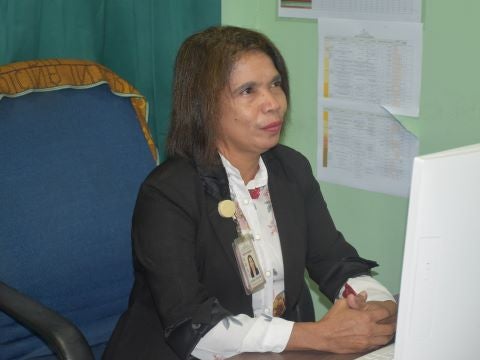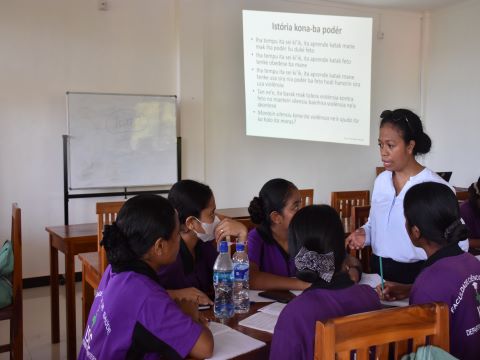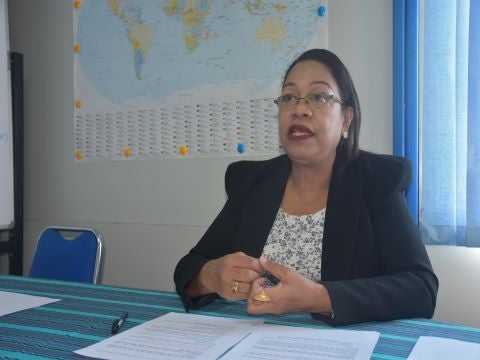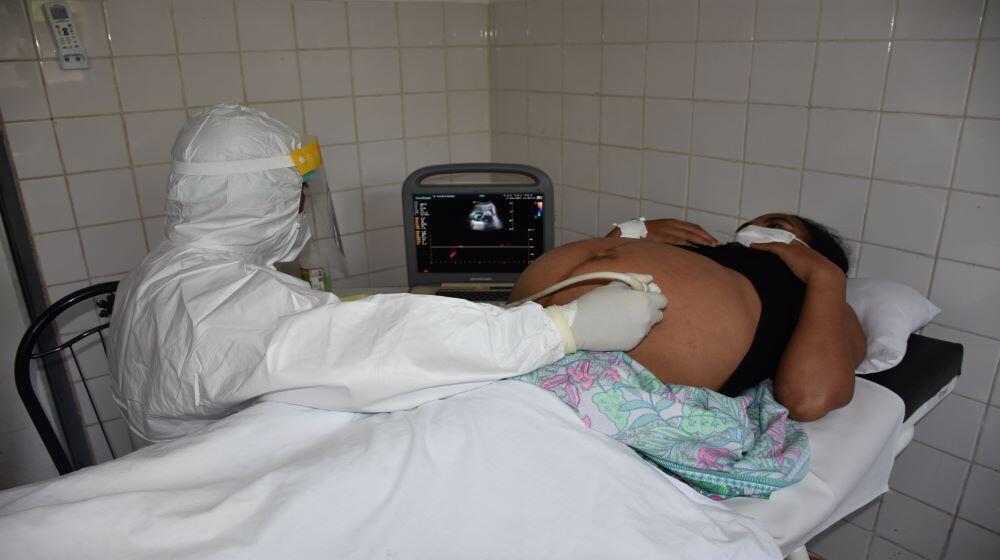Dili, May 05, 2022 -- In 1994, when Timor-Leste was still under Indonesian rule, Mrs. Sara Maria Filomena Xavier, a midwife trainer and Head of Quality Control Unit at National Hospital in Timor-Leste (HNGV), was a rookie midwife serving in Oecusse -- an isolated enclave inside Indonesian West Timor.
Sara Maria pursued her early education in Maubara, Liquiçá and later trained as a nurse and midwife in Indonesia – graduating in 1994. She was fully excited about her posting in Oecusse – her birth place – and looked forward to living her childhood dream of becoming a midwife.
“The time was around midnight… more than twenty years ago in Oecusse. I was woken up by a family member to assist a pregnant mother get urgent medical attention,” narrates Sara, who has over 28 years of experience in nursing and midwifery profession.
Not caring much about her interrupted sleep, she had walked through heavy rains accompanied by strong winds to reach the mother in distress.
“When we arrived at their home, the mother was already experiencing persistent contractions and had just delivered a beautiful baby girl. However, there was one problem. The mother had birth complications and a retained placenta (this occurs when part or all of placenta is not delivered after birth of a baby). I administered manual removal of the placenta but had no success,” adds Sara.

Mrs. Sara Maria Filomena Xavier in her office located at the National Hospital (HNGV) in Dili, Timor-Leste. © UNFPA Timor-Leste.
She then decided to accompany the mother to Kefamananu Health Centre -- the nearest health centre -- on the Indonesian side of Timor island located about 30km from Passabe in Oecusse.
“I remember the brother of the woman had to carry me on his back to help me cross an over-flowing river as we sought public transport. I am glad that now with improved infrastructure the distance can be covered in about one hour,” says Sara.
After a seven-hour ordeal on ragged terrains accompanying a bleeding mother with a retained placenta, she did not envision what she still had to cope with.
On reaching the hospital, she had to plead with the hospital administrators to accept the mother; unaware of how political tensions between Indonesia and Timor-Leste affected lives of marginalized mothers and babies living along the border.
At that time, hundreds of mothers and babies from neighboring districts with a common heritage still struggled to get decent health care services worsened by political hostilities between the two nations.
“I had to mention to the authorities that I was a nurse midwife and the patient would die if she was not admitted after traveling for seven hours and losing a lot of blood. I even told them that I helped hundreds of mothers from the Indonesian side of the border needing my services and it was only fair for them to accept her,” states Sara.
As we commemorate the International Day of the Midwife, marked globally on 5th May, the world still lacks one-third of midwives needed.
Similarly, there is insufficient investment in the health workforce as a whole and midwives in particular, as UNFPA’s 2021 State of the World’s Midwifery Report confirms, despite emerging evidence showing that midwives have enormous impact on improving health and preventing death.
The report, apart from showing progress and trends, identifies the barriers and challenges to future advancements in line with this year’s International Day of the Midwife’s theme: “100 Years of Progress”.
In Timor-Leste, most midwives continue to work under tough conditions characterized by poor infrastructure amid COVID-19 pandemic and other disasters.
Despite the challenges, their efforts and dedication to save and protect the health of mothers and babies is priceless and much needed.
“I believe being a midwife is a privileged profession. Midwives play a critical role in saving lives. Taking care of mothers and babies is my calling. It gives me great joy to serve mothers and babies and ensure they are safe and healthy before, during and after delivery,” says Sara, also a midwifery lecturer at Health Science Institute (ICS), in her office at the National Hospital in Dili, Timor-Leste.
Twenty-eight years later, Sara was recently pleasantly surprised to learn that the girl she midwifed is now a trained midwife while her mother, who almost lost her life in childbirth, is still alive.
Mrs. Alcinda Pinto Fernandes, a midwifery trainer and the Head of Midwifery Department at Instituto Superior Cristal (ISC) observes that although the role of midwives is critical, they are often understaffed.

Mrs. Alcinda Pinto Fernandes training midwifery students at Instituto Superior Cristal (ISC) in Dili, Timor-Leste. © UNFPA Timor-Leste.
She urges the government to support in recruitment and facilitate better remuneration of midwives to promote quality of service.
Since 2018, over 118 trainees, most of them midwives, have benefited from Emergency Obstetric and Newborn Care (EmONC) training facilitated by Ministry of Health through National Health Institute (INS) with technical support from UNFPA.
Mrs. Domingas da Costa Pereira, The Director of National Health Institute (INS), notes that UNFPA has been critical in curriculum development and formulation of guidelines for midwifery training in Timor-Leste.
“Improving training needs for midwives should be a priority. The Ministry of Health and UNFPA established National Guidelines while INS with support from UNFPA established curriculum with information package for doctors and midwives to reduce maternal deaths,” said Mrs. Domingas.

The President of the Midwifery Association of Timor-Leste (APTL), Prof. Lidia Gomes. © UNFPA Timor-Leste.
The President of the Midwifery Association of Timor-Leste (APTL), Prof. Lidia Gomes also identifies capacity building as a critical area of focus to improve midwives’ quality of service.
“In 2000 when the Midwife Association of Timor-Leste was started, there were less than 100 midwives with bachelor’s degree in nursing in the country. Thankfully, the number has increased by over 300%.
“Government should continue offering educational support to midwives and allocate them according to needs of communities upon their graduation,” said Prof. Lidia.
While there has been progress, there is still work to be done to increase the number and quality of skilled birth attendants. UNFPA continues to support high-quality pre-service and in-service midwifery education, for example Emergency Obstetric and Newborn Care (EmONC) training to midwives and doctors, that conforms to International Confederation of Midwives (ICM) standards, and formulation of midwifery regulations in Timor-Leste.
“UNFPA, in collaboration with Timor-Leste Midwives Association (APTL), Ministry of Health and the National Institute of Heath (INS), also continue to strengthen the capacity of skilled birth attendants to provide high quality maternal health services especially in areas most in need – ensuring no one is left behind,” said Lorna Rolls, UNFPA Timor-Leste Country Representative a.i.
Timor-Leste has one of the highest maternal and infant mortality rates in the region; currently at 195 per 100,000 live births maternal mortality ratio and 30 per 1,000 live births infant mortality rate.
“We must invest in midwives as a way of accelerating progress towards achieving universal sexual and reproductive health and rights and laying the foundation for a better world,” noted Björn Andersson, UNFPA Asia-Pacific Regional Director.
“On International Day of the Midwife, let us demonstrate our commitment to the Sustainable Development Goals and invest in the shared and collective vision of a world where every pregnancy is wanted and every childbirth is safe.”
For more information, contact:
Suleiman Okoth
Communications and Programme Support Specialist
United Nations Population Fund (UNFPA), Timor-Leste
UN House, Caicoli Street
Dili, Timor-Leste
Mobile: +670 75169796
WhatsApp: +254 780534026
Email; okoth@unfpa.org


